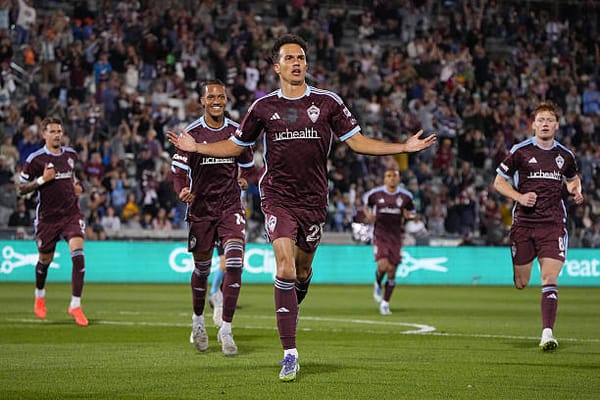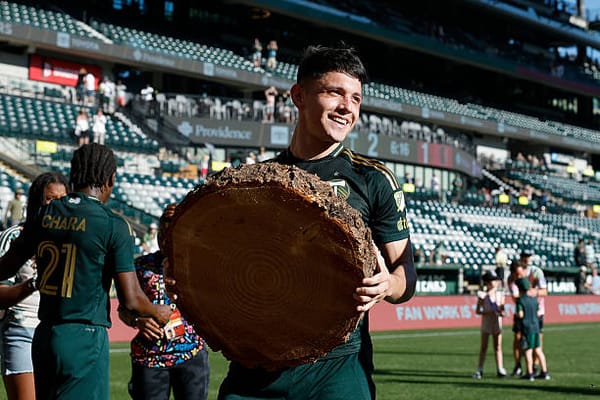An Act of Charity
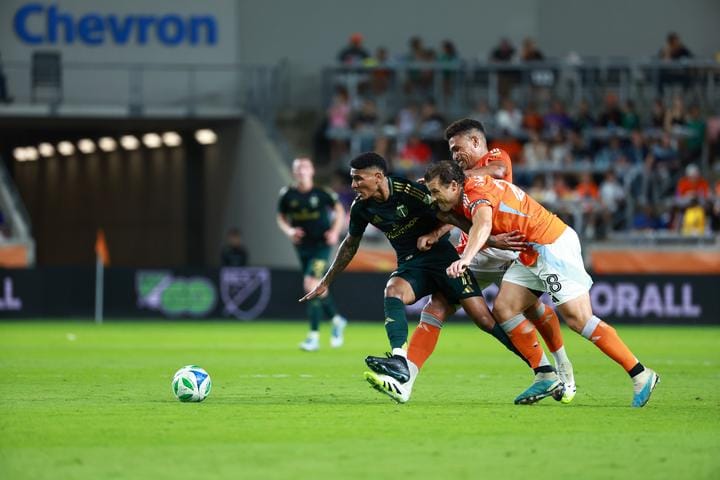
It’s a familiar tale. The Portland Timbers lost 1-0 in Houston. That’s the historical story that the Timbers added another chapter in. However, in doing so, they kept writing the story of their season.
Recap
Before the clock hit 2:00, Lawrence Ennali dribbled through the heart of Portland’s midfield and to the doorstep of the goal, but James Pantemis was on hand to deny the German at the near post. Two minutes later, Griffin Dorsey fed Ezequiel Ponce with a through ball. Ponce’s resulting attempt was blazed over the bar. In the 10th minute, Jack McGlynn took his first shot of the game. It was an attempt from outside the box, and Pantemis was able to easily corral it.
That’s three worrisome chances for the Dynamo within the first 10 minutes. In addition, the Timbers gave away three corner kicks in the first 15 minutes. However, Portland was able to respond with a big chance in the 19th minute. When you watch this sequence, you can see what the Timbers desperately want to be. Felipe Mora goes wide to receive an Ian Smith pass, but he immediately bounces it to Joao Ortiz. This creates space for Antony to run in behind and receive Ortiz’s through ball. It’s a very deliberate and well-designed passage of play that should be rewarded with a goal. That goal doesn’t come. Antony decides to take an extra touch, which allows Jonathan Bond the extra time to charge out of his goal and close down the angle. So Antony’s shot is easily parried away by the English goalkeeper. Tough, but something to build on.
For the rest of the first half, they failed to build on that chance. It ended up being Portland’s only shot for the entirety of the first half. Houston had another chance in the 31st minute. McGlynn played a chipped pass into the box that fell onto Ennali’s foot. However, the German’s finish fell *just* outside the frame of the goal. But they didn’t need to wait too long to get a deserved goal.
McGlynn’s corner kick delivery found the free head of Ponce in the 44th minute.
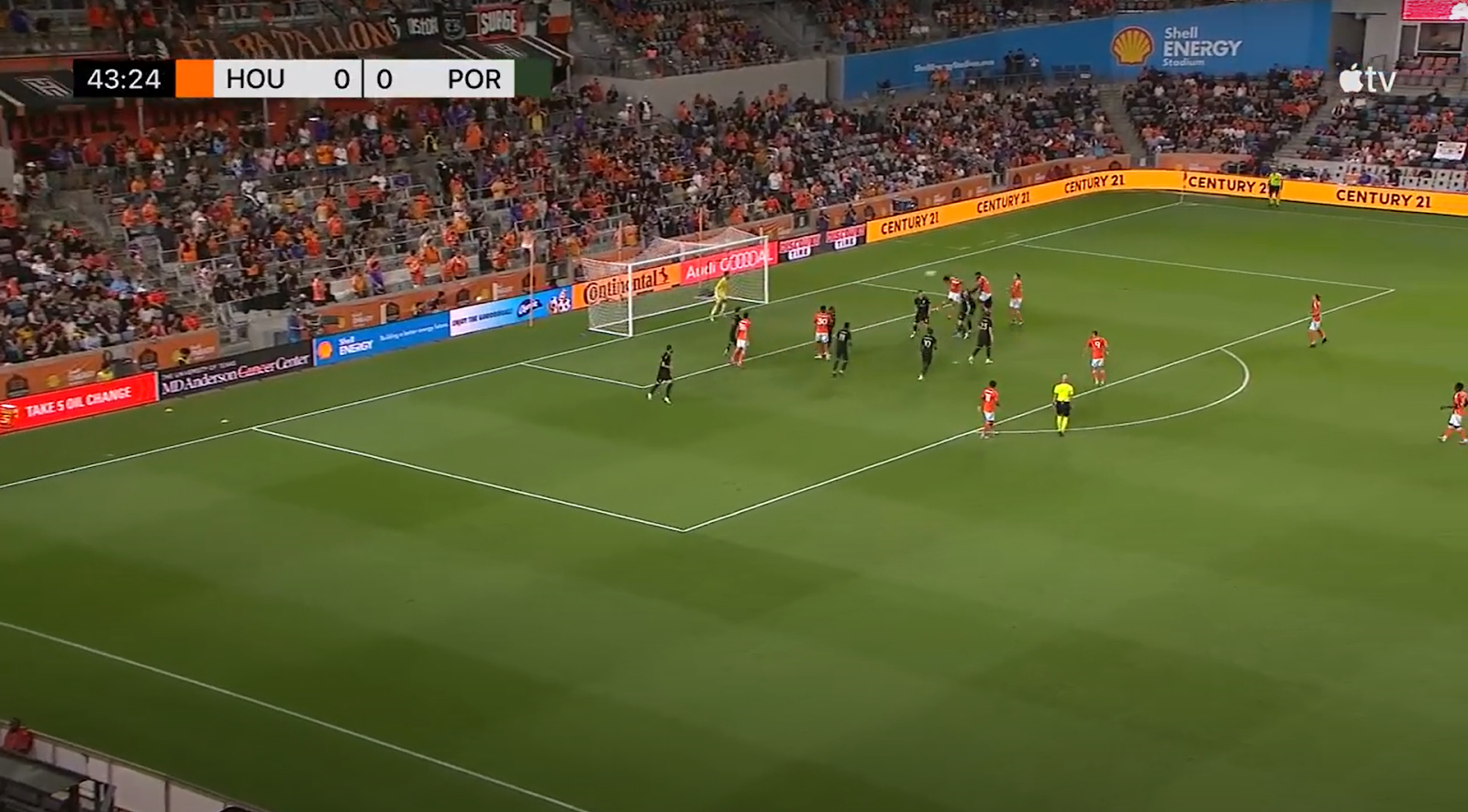
Ponce is able to get goal-side of two defenders, and Finn Surman doesn’t break from his zone in time to challenge for the header. Simple as that.
With a 1-0 lead at halftime, and Portland’s attack offering nothing in the first half, the Dynamo were comfortable with the state of the game. The Timbers probably weren’t either. However, that didn’t show on the pitch.
More loose touches and bad passes led to turnovers. That’s a familiar story. Portland’s first shot of the second half was a Kristoffer Velde free kick from about 30 yards out. It was an easy catch for Bond. McGlynn tested Pantemis again in the 66th minute, but the Canadian goalkeeper was able to push it aside. Something important happened in the 75th minute, but I’ll get to it later. However, two other important moments occurred in the 77th and 78th minute.
Let’s go in chronological order. Substitute Mati Rojas played a diagonal to a wide-open Antony, who took a touch off his chest and tested Bond at his near post (to no avail). Then Rojas decided to take matters into his own hands; unleashing a fierce shot from distance that clanged off the crossbar. McGlynn once again tried to increase Houston’s lead in the 85th minute, and Pantemis denied him again, which forced a corner kick. The Dynamo had another big chance that came from this corner. After McGlynn’s delivery was cleared, Dorsey’s second cross found a wide-open Felipe Andrade in the box, but his volley was parried by Pantemis to force another corner. A clean spell of build-up created another chance for Rojas, but he was denied by Bond at the near post.
Their final chances to tie came in second half stoppage time. First was Ian Smith’s dangerous ball into the box. Kevin Kelsy tried to meet it but missed. However, that Kelsy run distracted Bond, and the ball caromed off the post and directly in front of the goal. Erik Sviatchenko made a desperate clearance to get the ball out of danger with Surman closing in. The final chance came from a Pantemis long ball. Surman won the header, and it fell to David Da Costa. Immediately, Da Costa unleashed a fierce volley, but it hit the post and flew out of bounds. It was the last chance for the Timbers, who were unable to overcome the desperate Dynamo.
Breakdown
I could call this one of Portland’s worst performances of the season. However, if a couple things break their way (like a pull on Dario Zuparic in the box in the 90th minute and any of the three crossbars taking a favorable ricochet) the Timbers could have taken a point in this game. At this stage of the season, the results are far more important than the path the team takes to get those results. However, since tonight’s performance indicated that the Timbers probably should’ve lost this game by multiple goals, a deeper dive into their failures is warranted.
Structure (Defense)
It begins at the front. Two weeks ago, I published an article about what the Timbers need to do in order to be tougher to beat. Teams that are good with the ball are properly equipped to punish the Timbers. This has been known for the entire season. Finn Surman and James Pantemis (along with Dario Zuparic and Jimer Fory, when they play) are the biggest reasons why Portland’s defense has been able to keep the team competitive. All of them are excellent shields. They’re very good at using their bodies to block the ball. Those players are asked to do an obscene amount of work, and that blocking workload was really high in today’s game. However, they wouldn’t be forced into so many desperate situations if the Timbers were able to defend from the front.
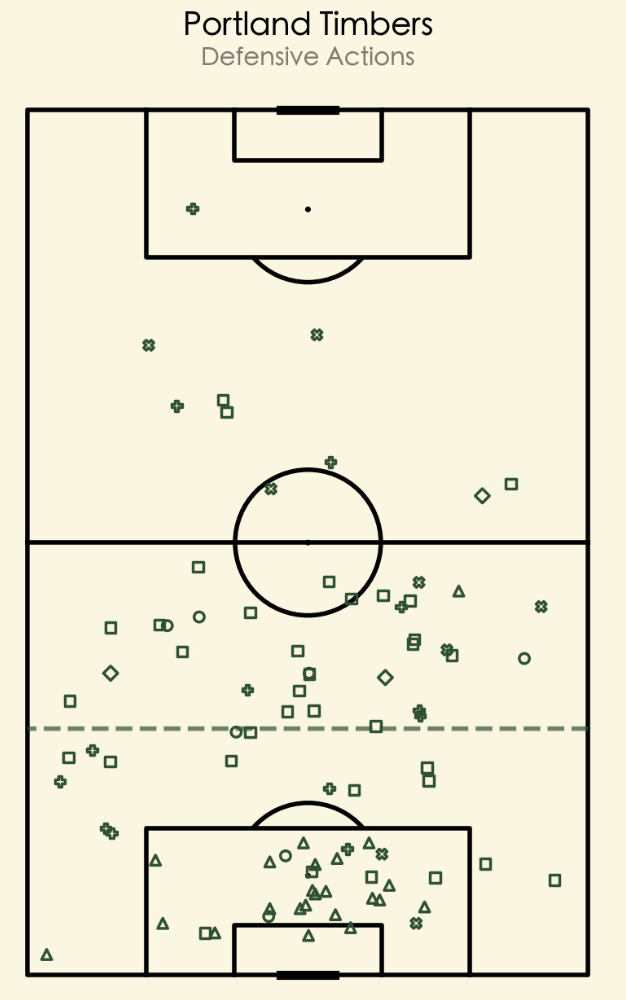
The Timbers offer negative resistance in the opposition half. Considering their primary pressing structure is in a 4-2-4 shape, it’s very concerning. One pass is enough to break the first line, and it could even break two lines if the midfield is disorganized. This structure has to be better. Tonight, I was mostly concerned with the marking assignments.
The structure is already bad enough, but poor marking assignments make it worse. In the first half, I noticed that Antony was tasked with pressuring Houston center back Erik Sviatchenko. As a result, a ton of space was opened on the Dynamo’s right side. That’s their primary avenue for ball progression. It’s been their primary side since Olsen took over and installed this system! If the Timbers were going to try and pressure Houston, Da Costa should have been marking Sviatchenko with Antony responsible for Dorsey. It’s those types of errors that exacerbate the already serious problem of their poor off-ball structure.
Because Houston was able to progress the ball at will, they were able to take a metric ton of shots (21, to be exact). These shots had a wild variance of threat, but it did demonstrate a key difference between each team: one wanted to win and the other didn’t.
Mentality (Offense)
Scoring goals requires the ball to be shot towards the goal. The Timbers ended tonight’s game with 7 total shots; one-third of the tally their counterparts registered. All three of their shots on target resulted in easy saves for Bond. The first half was putrid from an attacking standpoint, but the second half was even more infuriating.
The Timbers (as a team) showed a complete lack of urgency until the game was almost over. There’s even a chart to prove it!
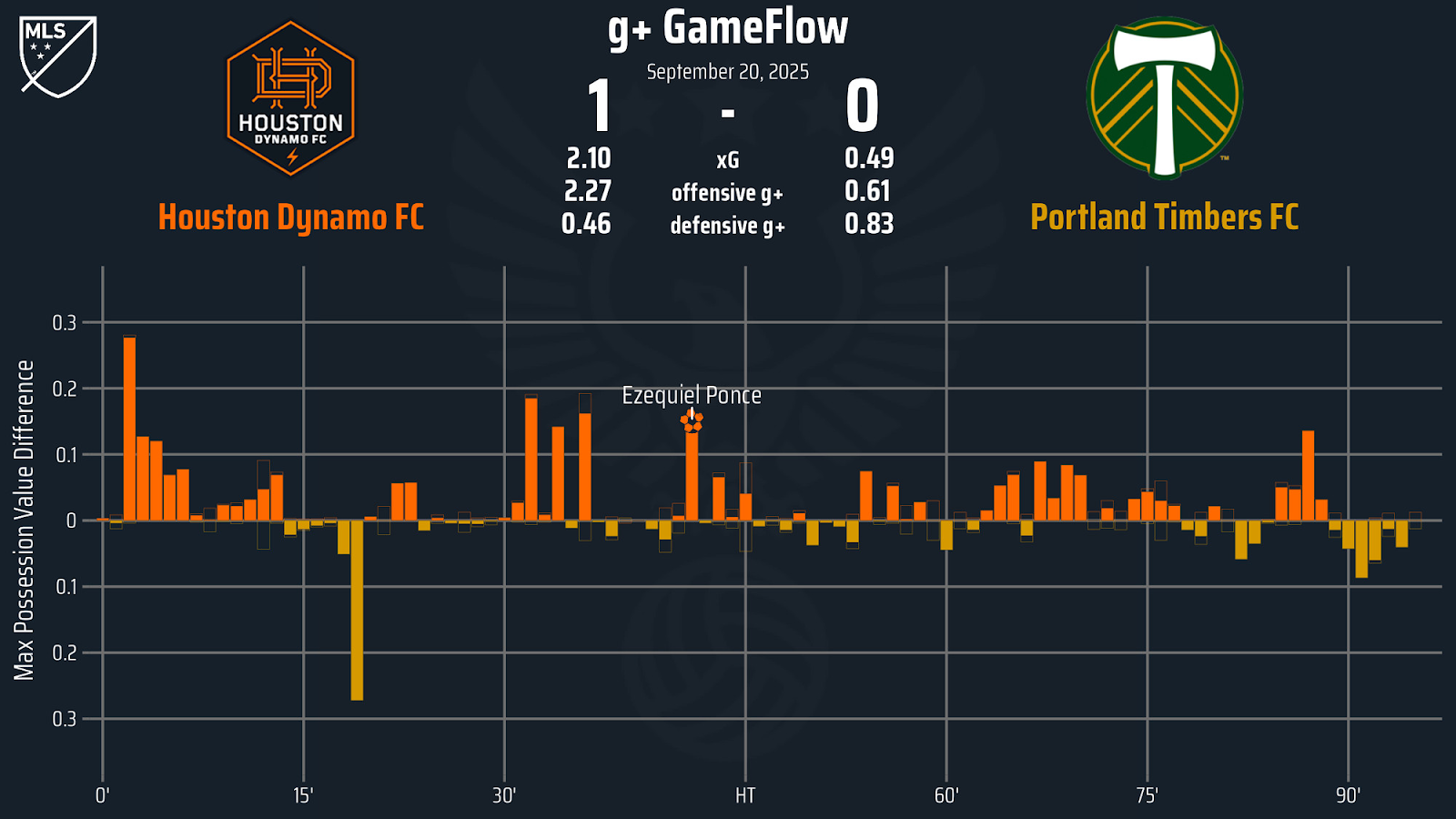
In order to score goals, you have to be willing to take risks. For the majority of the second half, Portland was more comfortable passing the ball backwards and sideways rather than forward into dangerous areas. I mentioned earlier that a major moment occurred in the 75th minute. Eric Miller received the ball on the right wing from a very good Cristhian Paredes diagonal. Instead of allowing the ball to come to his dominant right foot, he cuts it back onto his left. He doesn’t need to make that turn. There’s no pressure around him.
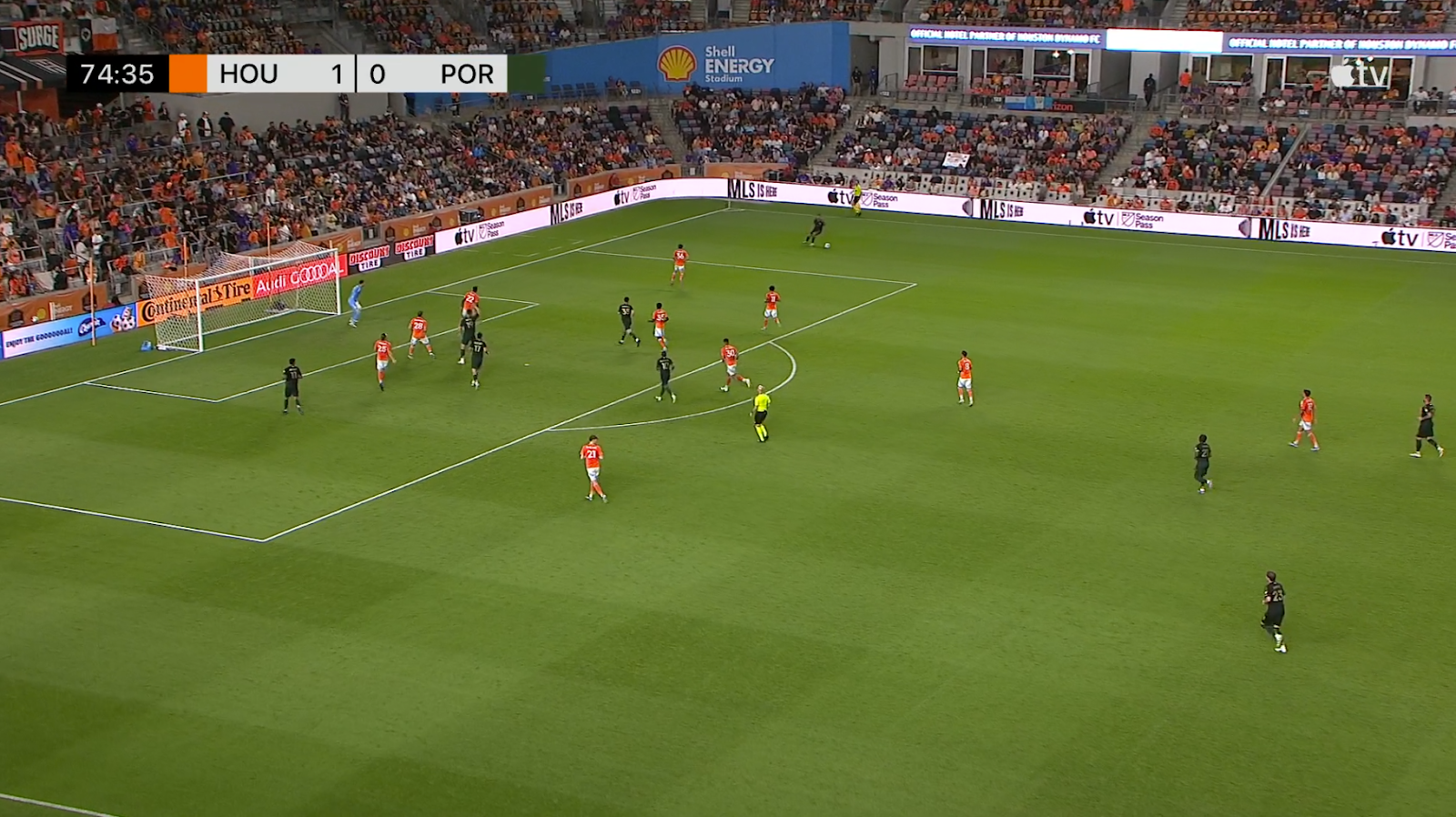
Portland created a numerical advantage in Houston’s box. Instead of whipping this cross in, Miller stands on the ball.
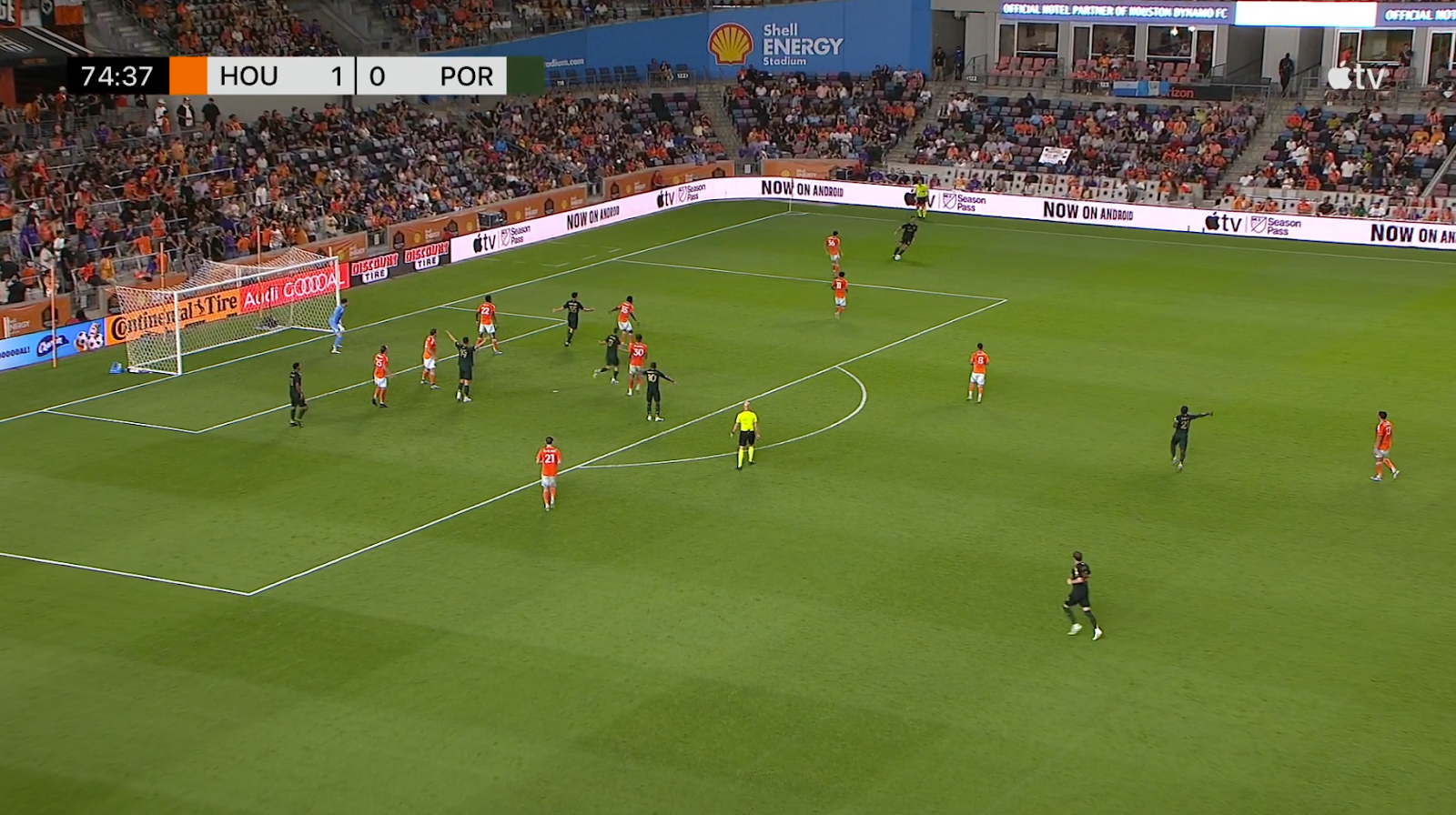
He’s halted long enough for Felipe Andrade to pressure him. He wasn’t under any pressure before. Somehow, in a prime situation to deliver a ball (ANY BALL) into the box, he chose to allow himself to get pressured.
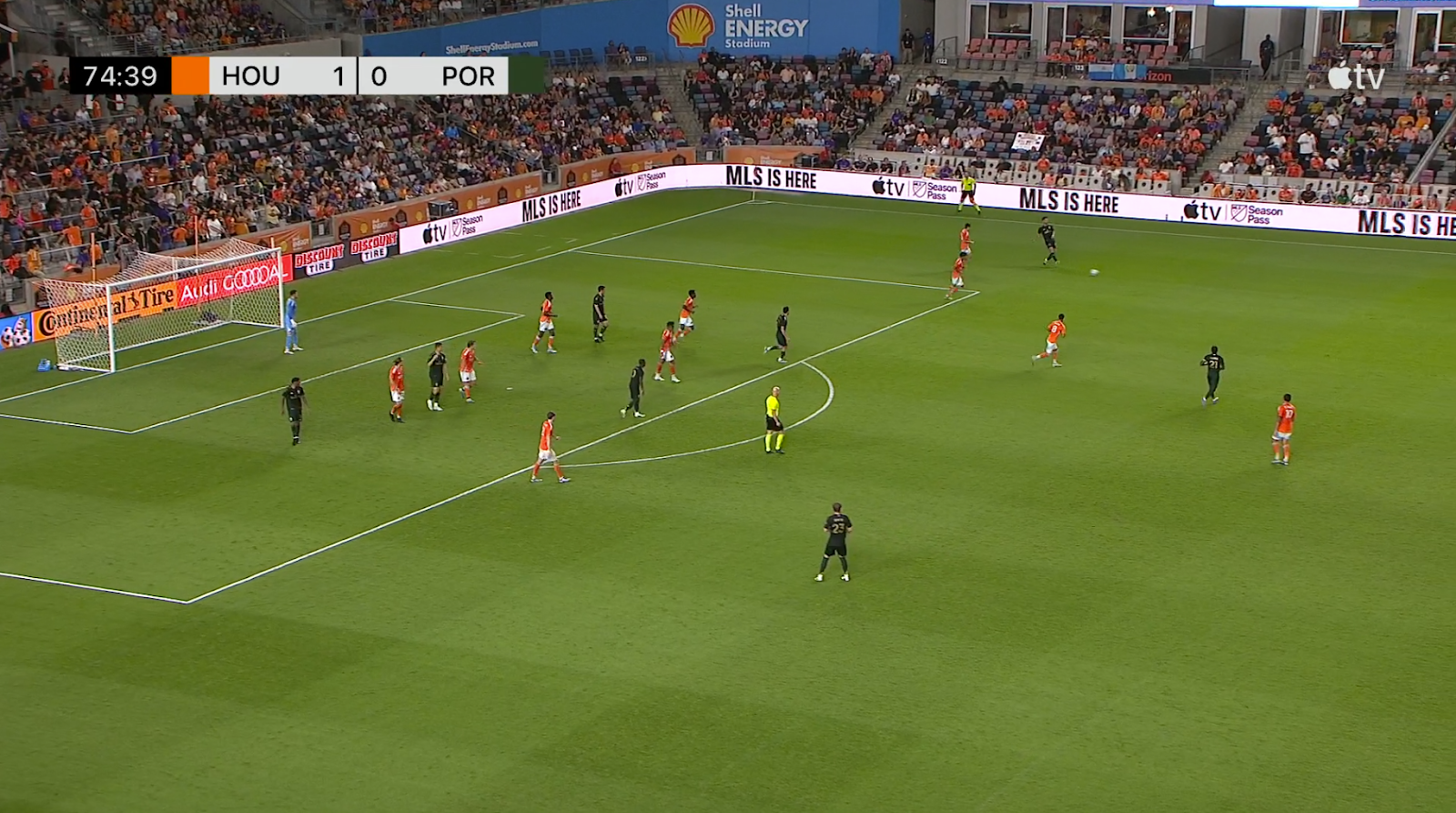
Because there is suddenly pressure on him (that he invited by not doing anything) he's forced into a backwards pass. Portland continues to keep the ball moving but eventually a heavy touch from Antony puts the ball out of bounds.
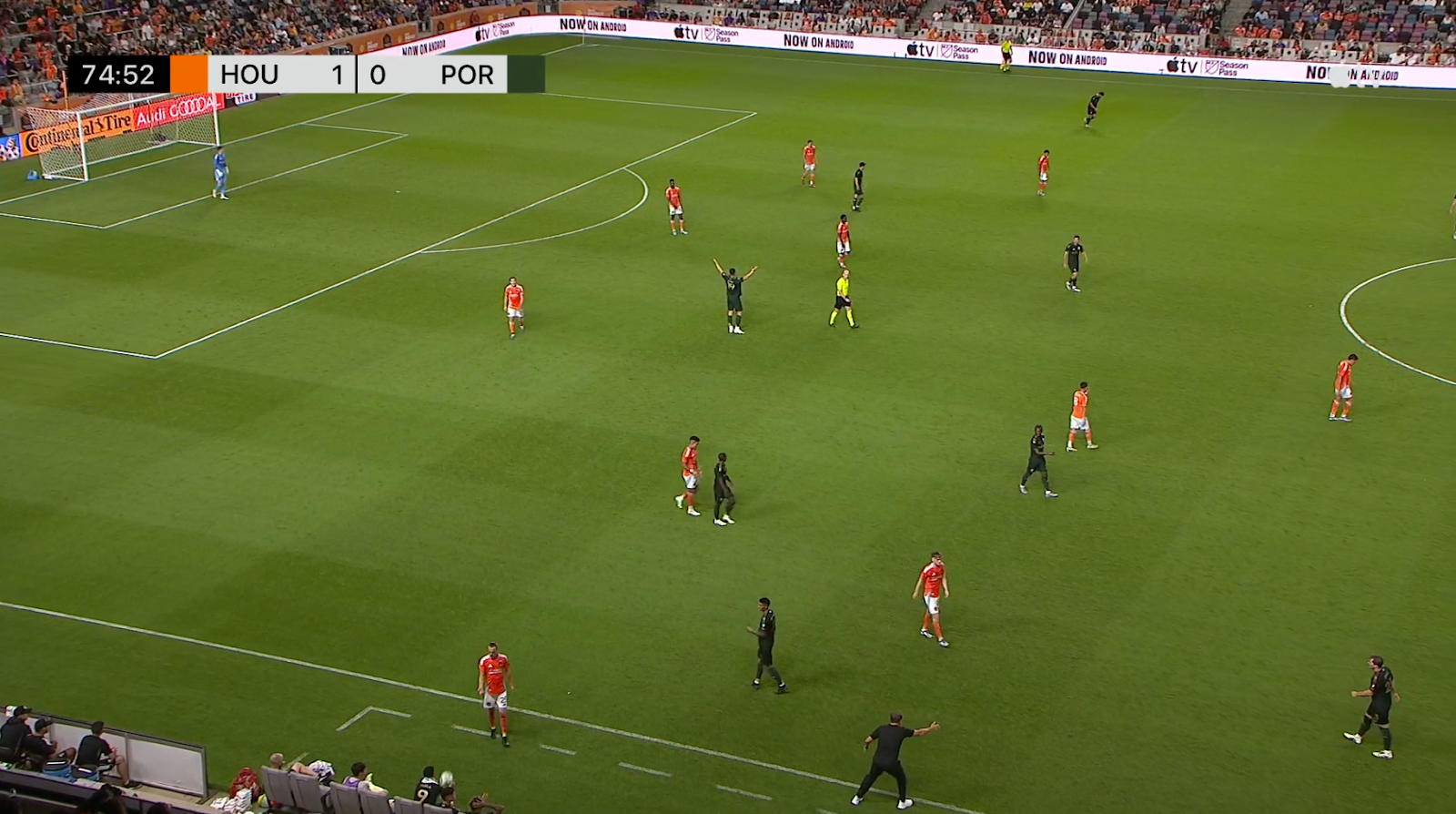
Kevin Kelsy is irate. He cannot believe what just happened. In the first picture, his hand is up. He desperately wants that ball. He knows that Miller could swing in a cross, and he's going to do his damndest to get to it. But it doesn't come. Every single Timber fan watching this game had the same exact expression as Kelsy.
This is one moment in a game chock-full of wasteful backpasses. While I do believe that the coaching staff needs to work on the defensive shape, I see Portland's attacking woes as a reflection of mentality.
In order to score goals, you have to want to score goals. Don't get me wrong; Phil Neville definitely has a way he wants these Timbers to score goals. He wants them to author beautiful sequences, like the one that led to Antony's chance in the first half. The Timbers can afford to play like that when the opportunity presents itself. But this has been a problem all season; regardless of the personnel on the field.
Portland's lack of risk-taking has a clear parallel to Neville's comments after last weekend's victory against New York. The bar got lowered from the "ruthlessness" that Neville was demanding last weekend. Instead, the Timbers sat on their hands and refused to take risks until stoppage time. That's the biggest takeaway from an attacking standpoint.
Player Ratings
James Pantemis: 9.5
Pantemis' shot-stopping was the only thing that kept the scoreline at a respectable 1-0. In addition, he was willing to take risks in distribution. A couple of first half long balls to Mora and Velde could have started some threatening attacks, but they were wasted by receivers. That concession was not his fault either. It’s a good bit of heading from Ponce, and Pantemis was *this* close to getting a hand to it.
Eric Miller: 5
Most of my gripes about Miller’s performance actually fall into the coach rating rather than Mr. Reliable’s own section. So I’ll stick with the most passive play of the night (the bypassed crossing opportunity I highlighted above) and a couple of quotes from his press conference. For the record: I think it says a lot that he agreed to face the media after this game. I’ll get more into that later, but I’d like to highlight a couple of his quotes because they certainly raised my eyebrows.
Q: What did you think about the team’s willingness to go for it in the second half?
Miller: “I thought it was good. On the road, it’s really challenging in MLS. In these conditions against a team that likes to dominate the ball, I thought we gave a really good account of ourselves in the second half.”
Quick detour. I’m going to show you the game stats from the second half.
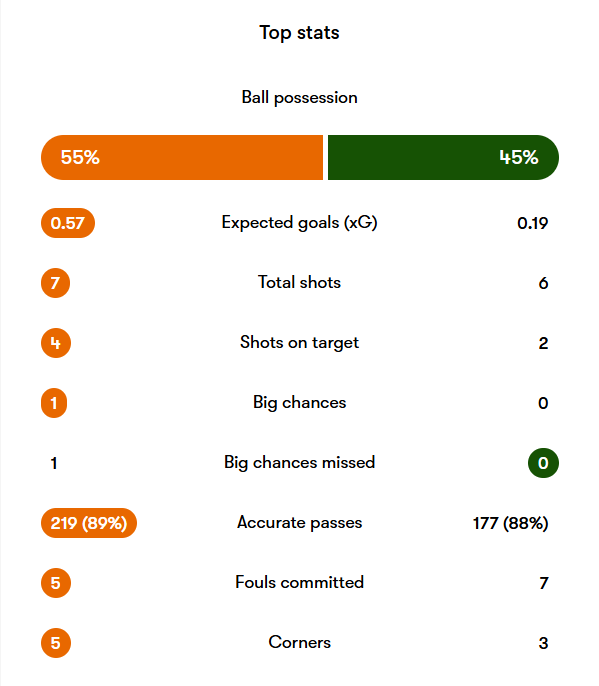
Antony’s first-half chance (their only chance of the first half) created more xG than all of Portland’s second half chances combined. In addition, the Timbers only took two shots in Houston’s box during the second half. Those shots came in the 89th and 90th minutes, and they combined for 0.07 xG. The Timbers attempted 202 passes in the second half, and 177 of them found their intended target. Of those 177, 106 were on Portland’s side of the field.
I don’t think that was a “very good account” of themselves. Let’s continue with Miller’s answer.
“I thought we had control. I thought we created chances. Obviously, they had a fair amount of shots but I also thought that in the second half we had some really good chances to score. I think we hit the post 3 times and some other big chances as well. Any time you can go on the road, and create chances like that, it’s always a good sign.”
I can understand having an optimistic perspective of a game that just didn’t go Portland’s way. However, tonight’s game was not the game Miller is describing.
That answer wasn’t great to hear, but Miller is a very good interview for a reason. During this presser, he called Velde a “slasher” in the Antony mold (I agree with that) and acknowledged that it’s hard to be a spot starter when the presumed starter is unavailable. Miller only started tonight because Juan Mosquera picked up a knock in training on Friday and was scratched from the matchday squad.
Finn Surman: 8.4
Surman gradually grew into the game, but those first 10 minutes were a pretty rough watch. He registered 7 clearances and 4 blocks. I think he was a bit slow to react on Houston’s goal, but I don’t think he’s the player who made the biggest error on that play.
Dario Zuparic: 9.3
I thought that Zuparic outperformed his younger partner tonight, and he was the best field player on the Timbers during this game. The Croatian acts as a human wall when he throws his body in front of every possible shot or cross. Without their defensive spine, this game becomes a lot uglier.
Ian Smith: 6.6
I don’t think Smith was particularly bad tonight, but he wasn’t at his best. Like Miller, he was starting on short notice in place of a Colombian fullback. Like Mosquera, Jimer Fory didn’t make tonight’s squad due to hip soreness. I wish Smith had more opportunities to get forward and send balls into the box. One of his only chances to do so resulted in Portland’s lone moment of the game where they actually created chaos in Houston’s penalty area (the 90th minute diagonal I mentioned earlier).
Joao Ortiz: 7.8
Let’s be perfectly clear: Joao Ortiz did not deserve that yellow card. It definitely was a foul, yes, but I thought it was weird for Ortiz to get booked for a pretty routine challenge. Per my notes, it was the third foul of the game for either team. I wrote in my preview of this game that Allen Chapman’s ratio of yellow cards per game is the lowest in the league by a pretty decent margin. Tonight, he nearly tripled that average by booking 7 different players. Some of these were definitely yellow-worthy (like Pablo Ortiz’s 38th minute caution) but most of them were pretty run-of-the-mill fouls.
That yellow card affected his defensive abilities, but there were times when he was playing like a number 10. I think this was one of Ortiz’s best on-ball games of the season. In a team begging for risks, the Ecuadorian routinely tried to play dangerous diagonals or through balls. It was his through ball that set up Antony in the 19th minute. This marked the second game in a row that Ortiz found Antony in the box with a through ball, and the second game in a row that the Brazilian flubbed the chance. He should have two assists in the past two games, for God’s sake.
David Ayala: 6.8
This was not one of Ayala’s best games. I thought he was relatively OK defensively aside from allowing his marker (Ponce) to get goal-side of him on Houston’s goal. That’s right, folks. David Ayala was marking Ponce on Houston’s goal. I think a striker vs. defensive midfielder matchup on a set piece is usually a mismatch in the striker’s favor. His passing erred on the side of caution rather than risk. I don’t think he was the reason Portland lost, but you could tell it was somewhat of an off-night.
Kristoffer Velde: 6.7
Can you give points for effort? I certainly think you can. Velde’s effort was certainly showing, but the quality wasn’t there. Several loose touches, poor passes, and inability to find his teammates combined to form a pretty underwhelming performance. When he was subbed off, the camera caught his unhappy reaction. I’m a fan of a player that is angry when he’s leaving the pitch. This could be anger at himself for a poor performance or anger at the coach for not allowing him to try to make a difference.
David Da Costa: 6.2
Speaking of anger, Neville was very adamant after each of the past two games that Da Costa was “angry” about being left out. He repeated the same phrasing on Thursday, which led me to believe that the David Da Costa who took the field in Houston would play with fire in his belly.
Per American Soccer Analysis’ G+ metric, Da Costa was Portland’s best player (tied with Zuparic). This strikes me as a little odd. Sofascore credits him with 3 chances created, but most of those were layoffs to a player (usually Rojas) to tee up a shot from outside the box. Even if he didn’t light up the stat sheet, I was expecting to see the fire of a player who had to come off the bench for the past two games despite being the team’s centerpiece.
That fire, simply put, wasn’t there. I can (somewhat) excuse a lackluster creative outing if there’s a willingness to put in maximum effort off the ball. Earlier in the season, I said that Da Costa made the Timbers a complete team because of his off-ball capabilities. It gives me no pleasure to report the following.
Stats don’t always tell the whole story, but sometimes they do. Across all attacking midfielders/wingers in North and South American leagues, Da Costa ranks in the 1st percentile for defensive actions. This includes tackles, interceptions, recoveries, clearances, etc. Defending with Da Costa on the pitch is like defending with 10 men. During tonight’s game, he often dropped off the first line to mark the opposition holding midfielder (usually Junior Urso). However, his pressure was purely positional with a complete absence of aggression. This included a brief stretch after Mati Rojas’ introduction where he dropped back a line to play as an 8. During that time, he looked like a traffic cone. He didn’t want to put in a tackle. He didn’t want to block passes or pressure a ball carrier. It was mindboggling, especially for a guy that Neville said was “banging his door down” to start tonight’s game.
Since he was being a complete passenger defensively, his attacking contributions (or lack thereof, despite the stats) were even more apparent. His most notable moment of the match was his last-second rocket from outside the box that struck the post. It was nearly a signature DP moment for Da Costa, who hasn’t registered one since Leagues Cup. But two minutes before the post was rattled, he received the ball at the top of the box with another shooting opportunity. He passed it up, and it became a created chance for Rojas. An angry player takes that shot. An angry player becomes a thorn in the side of an opponent off the ball. This was not the return to the starting lineup that anyone was hoping to see from Da Costa. Instead of a difference-maker, he was closer to a liability.
Antony: 6.4
Last weekend, Antony wasn’t too complimentary of his performance. If he had the opportunity to speak about tonight’s game, he would’ve been even more critical. His biggest issue in this game was decision-making. Every player would dream of the chance he had in the 19th minute. But he failed by doing one thing: taking an extra touch.
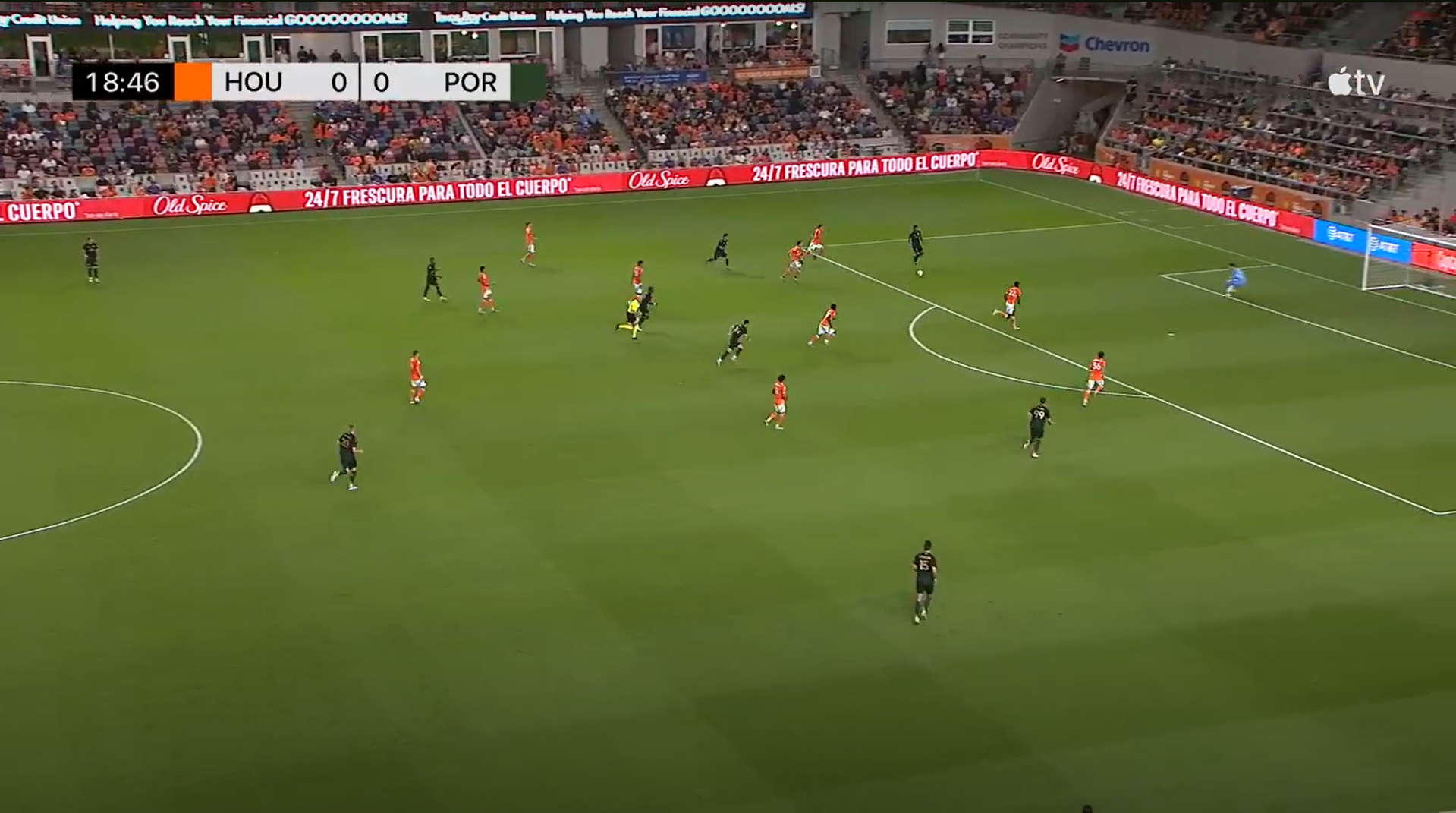
This is a chance that he should bury. This is a chance that he’s buried before. Instead, he hesitates.
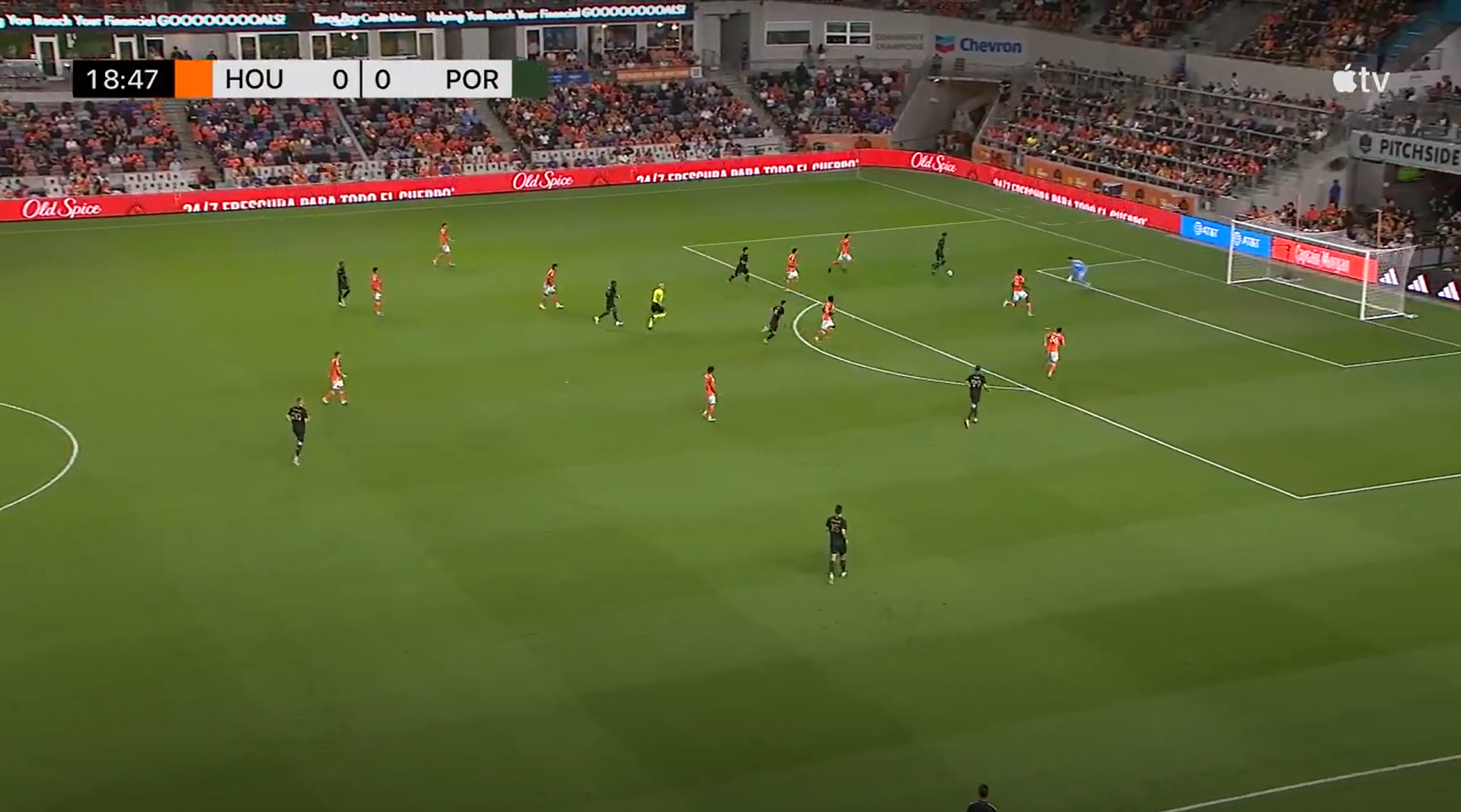
Now the angle is tighter, and Antony’s options for a shot are much more limited. Because he hesitated, the chance became much harder to score.
This is where the “ruthlessness” comes into play. In a nod to the mantra from the LAFC victory (the last road game Portland won), Antony failed to trust, believe, and deliver in his own ability to score this chance. Antony is the hardest working forward on the team. But as a forward, his job is to score and create. If he’s not scoring or creating he isn’t meeting the expectations of the coaching staff.
Felipe Mora: 6.5
Sometimes a picture can tell a thousand words.

Mora, like Justin Herbert, is a very good player. However, the question “what if?” has followed Mora in a similar way to the way it trails Herbert.
The Chilean hasn’t scored in 18 consecutive MLS games. And in most of those games, he hasn’t come close to finding the net. He spent 69 minutes on the field tonight, and failed to register a single touch in Houston’s box.
This doesn’t preclude the possibility of him having chances. Herbert’s “what if?” is about his supporting cast. Mora’s “what if?” is about him gelling with his new supporting cast. He’s been operating on a tape delay during this season. Despite all the value he adds in possession as a playmaking striker, he’s usually a half-step behind when it comes to getting on the end of service. His most notable play in this game was getting in a major collision with Bond that could’ve resulted in a penalty kick. But it didn’t.
Mati Rojas: 8
The Paraguayan knew exactly what this game called for. After a slow start in his first two games, Rojas has really hit the ground running in his last two. His introduction was exactly what this game needed. Here’s a player who wants to take risks and actually does so. The bar robbed him of a Goal of the Year contender, and his willingness to try that shot (combined with the confidence to smash it off his left boot) provided the Timbers with their most dangerous attacking threat of the entire game. When he arrived, I thought he’d be a supersub at most. However, he’s quickly playing himself into a starting role. Neville said that Rojas “treated this game like a cup final.” I wholeheartedly agree.
Diego Chara: 7
Chara was also mentioned in that “cup final” quote. Although he doesn’t cover ground like he used to, his passing range was on full display. He was one of the players consistently pushing the ball forward after entering the game.
Cristhian Paredes: 7
Paredes, unsurprisingly, also featured in the “cup final” quote. I think he’s Portland’s best midfielder in terms of off-ball movement around the box. He has a great eye for a pass and isn’t afraid to crash the penalty area. In the 75th minute, he gave the ball away but quickly recovered to intercept an Amine Bassi cross. I admire his willingness to personally atone for his mistakes.
Kevin Kelsy: 6.6
Kelsy really wants the ball everytime he gets on the pitch. Sometimes, that can result in some good hold-up play. However, he made one rather innocuous error that needs to be highlighted.
In the 87th minute, Kelsy received the ball deep in Portland’s half. Rather than making an outlet pass, he held onto it, carried it in a circle, and eventually passed it backwards which led to a turnover. He’s not the only player to do something like this, but as a striker the impetus is on him to get rid of the ball and immediately get back to the top of Portland’s shape.
Kelsy’s continued internal conflict between being an on-ball striker and a line leader is something the Timbers have to figure out in the near future. Although Mora is in the middle of a freezing cold stretch, he always stays up top. I’m still a fan of his because I can see the player he can become. The Timbers need him to quickly become that player.
Ariel Lassiter: 7.5
One Lassiter screenshot is all I need to justify this rating.
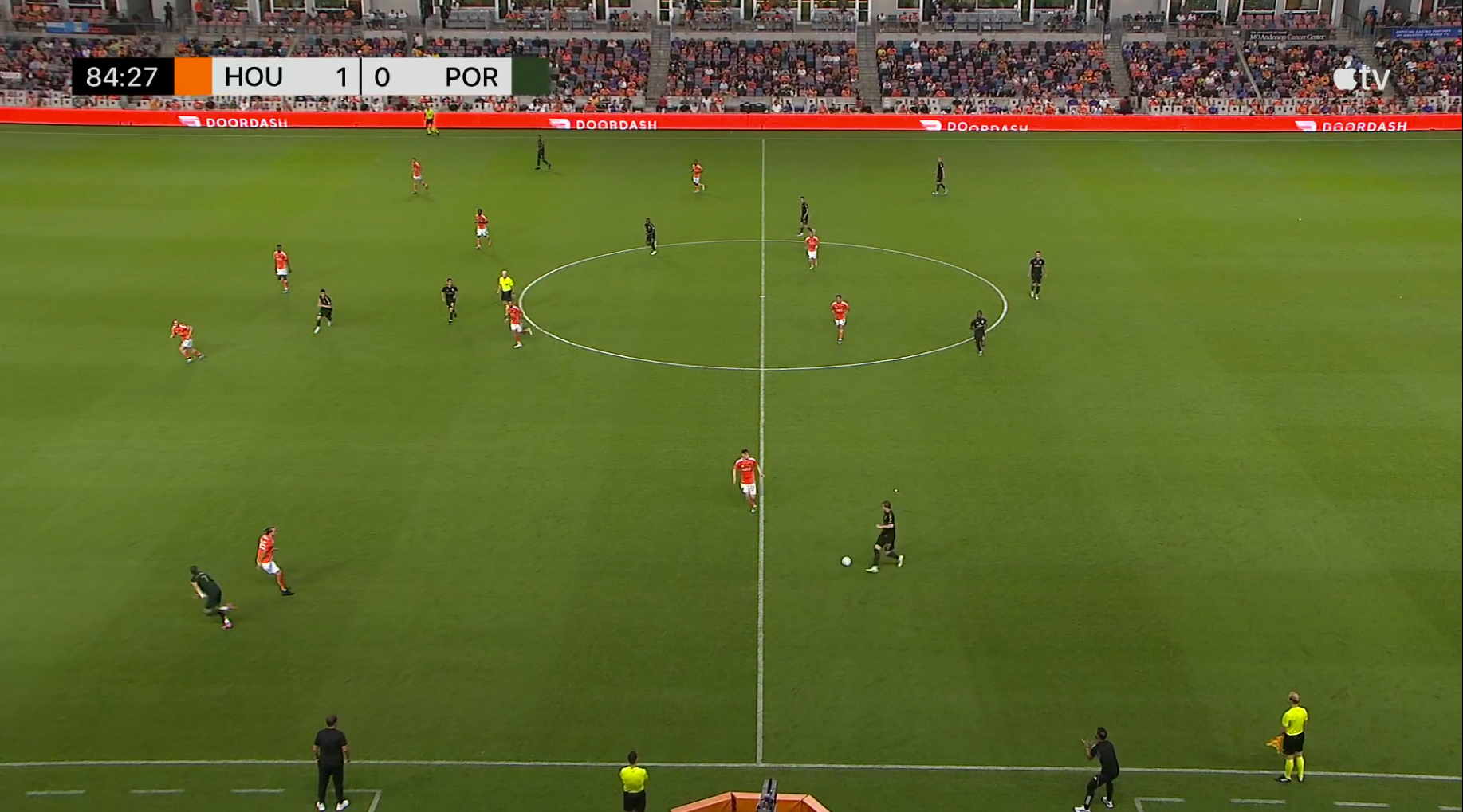
I can’t clip the whole play. It took me forever to even get this picture without the entire image turning black. But it was important enough to acquire because of this one run he’s trying to make.
Let’s set the scene. Portland forced a midfield turnover and the ball got recycled wide to Smith. When the ball is on its way to the rookie fullback, Lassiter drops deep and draws Dorsey with him. Once the ball reaches Smith, Lassiter immediately explodes up the field. This pass is on. Scratch that. It’s so on.
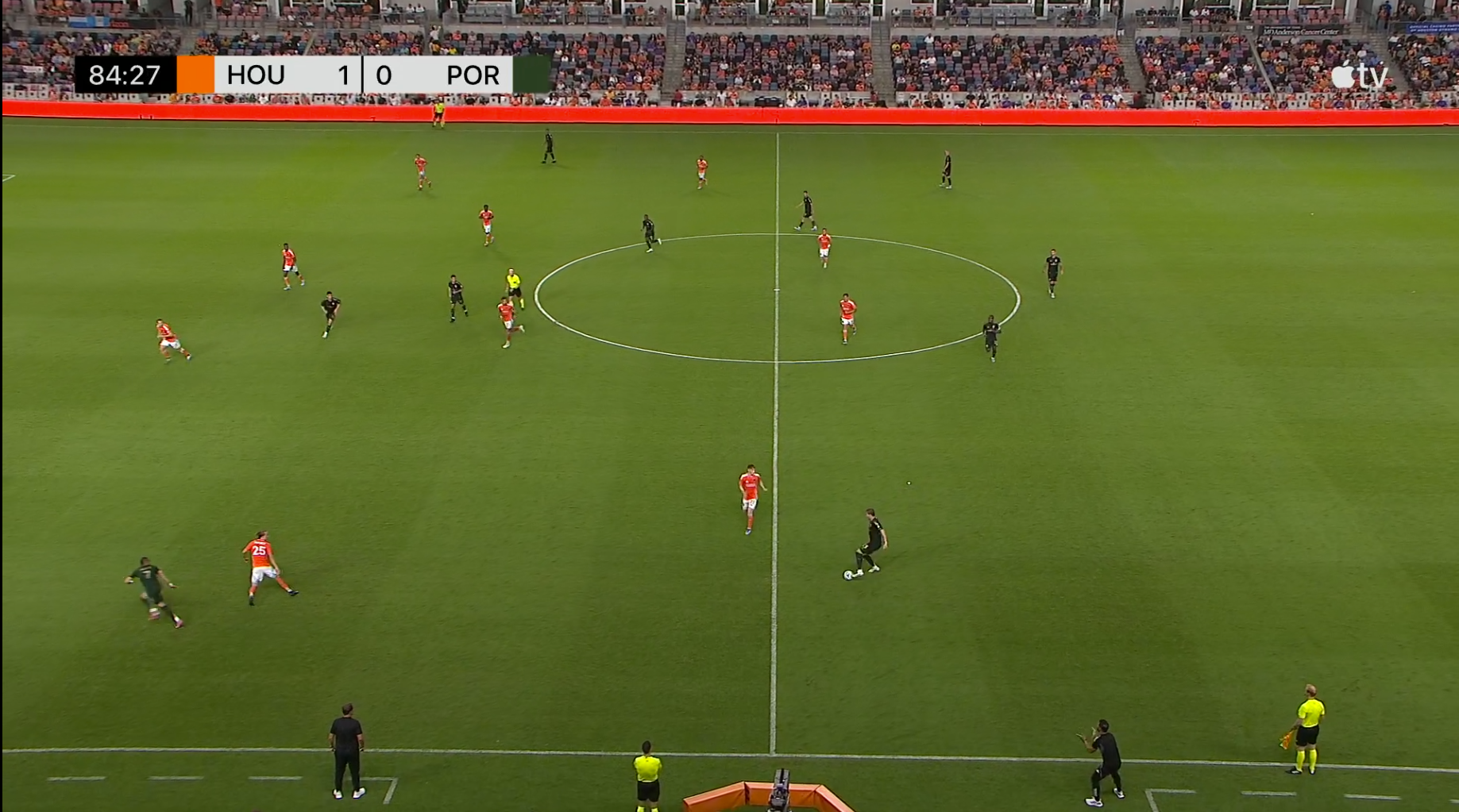
However, Smith decides to take a touch. This isn’t inherently a bad thing. A touch to the outside creates a little bit of space between Smith and the pressuring defender (McGlynn) and allows Smith to hit a more controlled ball over the top into the space that Lassiter is charging into. Both of Portland’s attackers in the center of the field can see this run, and they’ll be making support runs the instant that this ball is played. Unfortunately, Smith’s touch takes him inside, which allows McGlynn to close the gap rather quickly. This pass was on in the span of a second. But the window closes just as quickly. Why am I harping on this relatively minor play? Because Smith is unafraid to play these types of long balls. Lassiter was doing something that almost no other Timbers attacker was trying to do tonight: be a downfield outlet. The setup to the run was brilliant. The run was perfect. You can see Sviatchenko noticing Lassiter, which would surely open up a gap in the middle of Houston’s defense. But the poor choice to take a touch inside nullified an opportunity for the Timbers to attack directly and get players going towards Houston’s box at speed. This is something they didn’t do yesterday. But Ariel Lassiter was willing to try it.
Just this one run earns Lassiter a 7.5. I’m fully Lassiter-pilled after his recent emergence as a true field-stretching threat in this team that has players who can fill that role but don’t make the necessary runs to do so.
Coach Rating: 4
Neville was quick to take accountability for “maybe selecting the wrong players” for tonight’s starting lineup. However, I’m going to counter with one point. I don’t think he picked the wrong players. I think he failed to adjust to how serious the absences of Fory and Mosquera would be.
Both fullbacks who started this game are not direct replacements for the two Colombians. Smith is closer to Mosquera than Miller, while Miller is closer to Fory than Smith. Neville failed to change the team’s base tactic with Smith and Miller in the team. Here’s how the lineup and tactic should have looked without any changes to the player selection.
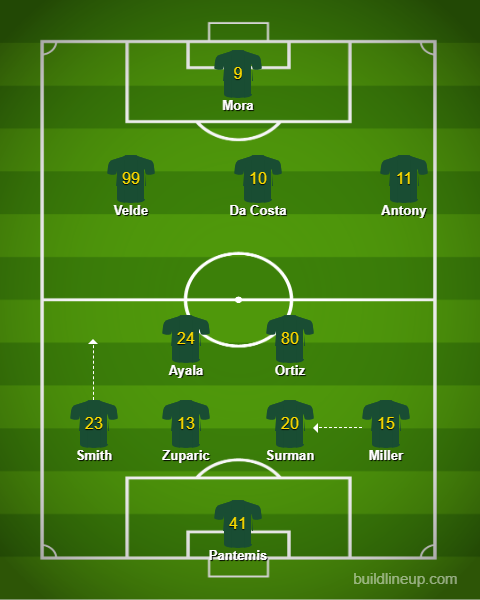
This allows the players who started yesterday’s game (once again, it wasn’t a bad lineup) to fulfill their roles with the fullback roles switching sides. Antony is the width-holder. It’s what he does on the left, but with the added ability to cut inside. On the right, he can provide crosses like Mosquera but with a better ability to carry the ball into dangerous spaces before hitting more threatening crosses. Velde and Da Costa can combine in the center of the pitch. Smith provides the width from the left and offers a better final ball (and more willingness to deliver it) than Miller. That’s a lot of running for Smith, so once he gets tired the substitution plan becomes very clear.
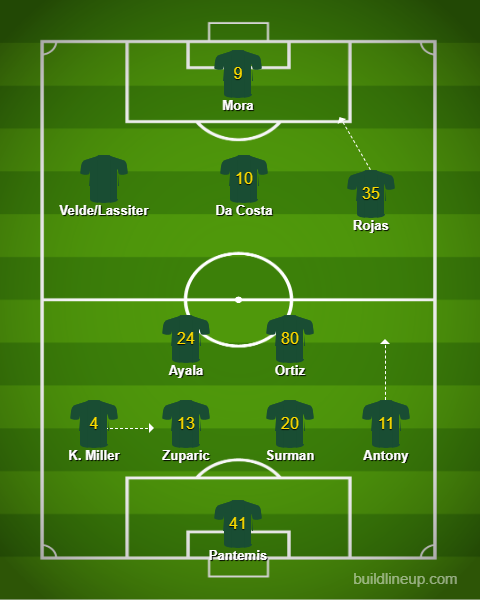
Is there much use in Monday morning quarterbacking to this degree? I think so. Neville’s main assessment that he got the team wrong is wrong. He got the roles wrong and failed to create the proper balance and conditions that make Portland’s attack work. Particularly the Velde version of the attack. If the plan was to take Velde off around the 70th minute (which could be the case given this week’s upcoming schedule) Lassiter would be the natural replacement to become the width-holder and crosser on the left. Or Velde stays in, and moves between the 10 role and the wing through fluid swaps with Da Costa. I know it’s a lot to have to come up with a new gameplan after the sudden absences of two key starters at important positions. But Neville should know by now that asking Eric Miller to play the Mosquera role does not help the team. As illustrated earlier, it actually hinders them.
I don’t believe in the “Neville’s attacking tactics are pure vibes” sentiment that’s been going around. He can’t control every single loose touch or bad pass. But being a head coach is about putting players in the best place to succeed (direct phrasing is “platform to play”). He said that during his post-game press conference. Yesterday, he didn’t provide the platform, and his team failed to deliver.
Table Time
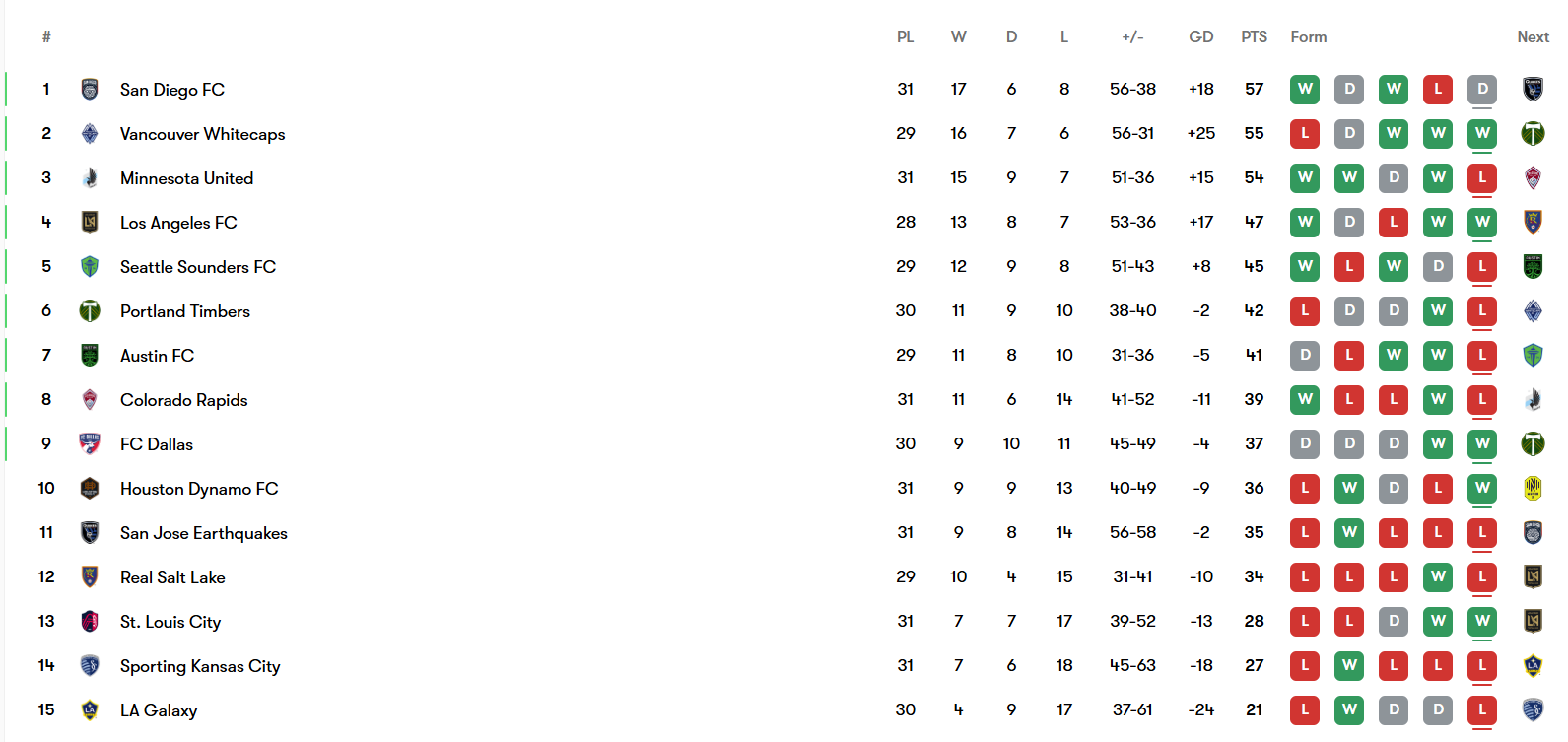
Brace yourselves, y’all. It’s time to root for the Seattle Sounders. Because the Timbers dropped points in a winnable game, the most logical choice for Sunday’s game between Austin and Seattle is a hope for a Sounders victory to keep the Timbers in 6th. Results below them sort of went their way, with another Rapids loss (this time to Dallas, who are now in a playoff spot and 5 points behind Portland) keeping the gap between the Timbers and the Wild Card game at three points. Houston is now back in the playoff picture, but the Earthquakes suffered the agony of defeat at home to a St. Louis team playing for pride. RSL is still mathematically alive, and they get a second crack at LAFC on Sunday. Three points would have gone a long way today.
Final Whistle
The environment of a road press conference is, at its core, lonely. While home teams get to take advantage of a cozy press room, opposing teams are often shoved into a convenient room that’s the size of a cupboard. Sometimes the road team gets lucky, and they can use an empty locker room. But at other places, it’s off to the closet.
After the Timbers lost 2-0 in Dallas, I entered the designated cupboard to speak to Neville and Ariel Lassiter. The door couldn’t fully open, and I was lucky enough to have a chair to sit in. Meanwhile, club support staff (usually people who create for the social media accounts) were also crammed into the room. For the interviewee, it’s the loneliest place in the world. You sit in front of a computer on a Zoom call, with the questions coming from the computer speakers hundreds of miles away. You can’t even see the faces of those who are asking. Most road press conferences are like this. It’s you and a computer.
As this website grows, I’m able to travel to more and more of these road games in an official capacity. At the start of the year, Houston was on my travel list. Then the Leagues Cup schedule was released, and I undertook the double event of Club America and FC Dallas. But as this Houston game got closer, I realized the case of FOMO that was heading my way. This was a game that I desperately wanted to be there for. Instead, I sacrificed this chance for Club America and Dallas.
As I entered the Zoom call for the post-game press conference, I knew what my question was. I knew what I absolutely needed to ask. However, this question would’ve been better asked in person. No one wants to hear direct criticism coming from a voice on a computer. I knew that. But the moment called for it, and I’d be failing in my reporting duties if I didn’t ask it.
Because I write better than I speak, the question spilled out in a jumbled manner:
“Hi coach, um, another tough road result. At the beginning of this year, you spoke about how you wanted this team to develop an identity. At this point in the season, it looks like the identity is closer to playing to the level of your opponents. Basically, you play well against the good teams, but you play down to, uh, teams that aren’t as good and you allow the results to slip away from you against teams that, in theory, the Timbers should be beating. So I’m wondering if you agree with that assessment and how that applies to tonight’s game.”
No one deserves to hear that in a closet through a computer screen. But Neville had to due to the performance and the result of tonight’s game. Here’s how he responded:
“I think that’s fair. You think our position in the table and we should be beating, you know, it’s always a difficult place to play. I think when you look at our results here over the last three to four years they haven’t been great, so I don’t think you can take any away, away…Away games in the MLS are not to be taken for granted but I think there’s definitely an element of…I look at it in another way, that when we play the top teams there’s no pressure on us. There’s no expectation on this young team and I think what I saw tonight, and I think I saw it at St. Louis and maybe at Toronto is that I’ve probably got to get the selections better for these games because you think about Rojas, Chara and Paredes. I thought the two center backs were fantastic and the goalkeeper. When they came on, they played like it was a final. And I felt like the others were waiting for something to happen. Waiting, ‘Oh, it’s OK, we’ll get another chance or we’ll get another opportunity or we’ll get another game.’ And we won’t get another game, you know. And I think that’s probably been a consistent pattern. So it’s something that, uh, it’s a big learning for myself and it’s a big learning for the younger players in the team is that you cannot wait. Nobody just comes and gives you three points.”
That’s the perfect line to take a quick detour out of this quote. Because coming to a town and giving a desperate team three points is what the Timbers have been doing all year. This isn’t a trend that’s unique to the MLS-era Timbers, but it is unique to Phil Neville’s Timbers.
On the 21st of September in 2024, the Timbers were slapped, punched back, put back on the ropes, and got themselves back to level terms in Salt Lake City. That was a formative game for the Phil Neville Timbers. Last season, the Timbers rarely rolled over and died on the road. They often went down early, but gave every ounce of themselves trying to fight their way back into the game. Sometimes it worked, sometimes it failed. But the 2025 team is lacking the same fire to drag themselves back from a one-goal deficit, while the 2024 Timbers weren’t down until the final whistle blew. The 2024 Timbers did lose a lot of road games, but they never made it out without landing some blows of their own. In 2025, the Timbers have a better road record by one point with two road games remaining. But their complete lack of urgency and will in some of these road losses display traits that the 2024 Timbers wouldn’t show.
The 2025 Timbers are givers. They're the most generous team in the league. They award teams that are worse than them with three points: Toronto, St. Louis, Dallas, RSL, and Houston. They could have slammed the door on the Dynamo’s playoff hopes. But they lacked the will and effort to do so.
Back to Neville’s quote:
“You’ve got to go out there and earn it. You’ve got to beat teams, you’ve got to punish teams.”
Portland’s last league victory by multiple goals was April 27th’s victory in Carson. Since then, the Timbers have dropped 3 games by multiple goals (San Jose, Toronto, and Dallas). Some of their other losses in that timeframe, like tonight’s, could’ve ended in a multi-goal margin. These Timbers aren’t punishing anyone; they’re letting themselves get punished instead.
“You’ve got to score chances when you get them. And I think alongside those types of results has been a real disappointment. And tonight, we had opportunities to score. I didn’t think that we deserved to win the game, but when you have chances to score you have to take them. If you don’t take them, these games are hard.”
He’s definitely thinking about Antony’s 19th-minute chance during this part of the answer.
“You think about the set plays, you’ve got to defend set plays. We did for the majority, but we slipped up on one and got punished.”
The answer ends on that word: punished. You don’t usually get punished for charitable giving. But in their own twisted way, the Timbers somehow managed to do both.
Every team in this league looks at Portland and thinks to themselves, “Hey, we can probably beat these guys.” But there’s one other part to Neville’s quote that deserves the last word:
“I look at it in another way, that when we play the top teams there’s no pressure on us. There’s no expectation on this young team…”
There aren’t expectations for this young team, except from ownership who has invested (per Transfermarkt) 22 million dollars in the past calendar year on new players. There aren’t expectations for this young team, except from the front office that spent time scouting, researching, negotiating, and bringing those players to Portland. There aren’t expectations for this young team, except from those who watched this team rise as high as second in the West during the spring. There’s always a base expectation that a team in a league that prides itself on parity will do whatever it takes to be competitive in a road game at any time, any date, and any place. There are expectations that this team will make the playoffs given their current table position. In the post-Evander era, there is an expectation of competitive growth.
Competitive growth means winning road games in difficult environments against weaker competition. Competitive growth means showing the rest of the league that the Timbers don’t go down without a fight. At this point of the season, where preparing for the playoffs and jostling for table position are more important than ever, performances like tonight's are completely unacceptable. It is not the time to be charitable. It is the time to be strong. It is the time to be ruthless. It is the time to be winners.
The Timbers do not have a ton of time to dwell on this result. They go from one bogey team to another as they travel to Vancouver on Wednesday for a game with playoff and regional implications. To lay it out in clear terms: the expectation is to be competitive. The expectation is to remind the wider MLS audience who the Phil Neville Timbers are: a team that doesn’t give up the fight. The climb continues.

